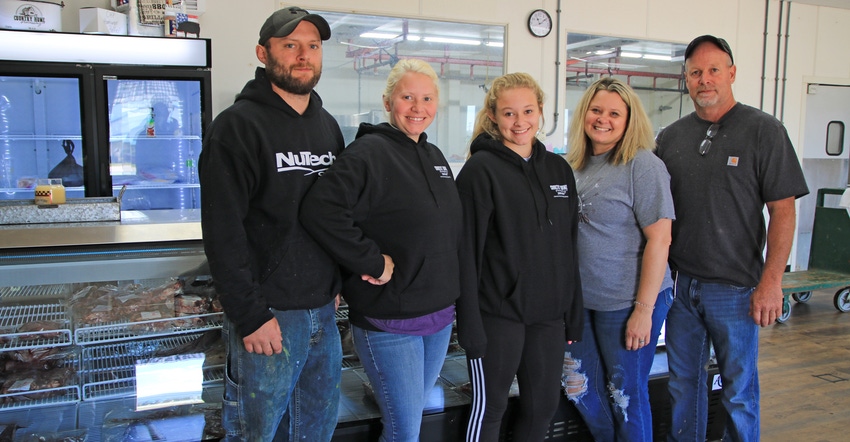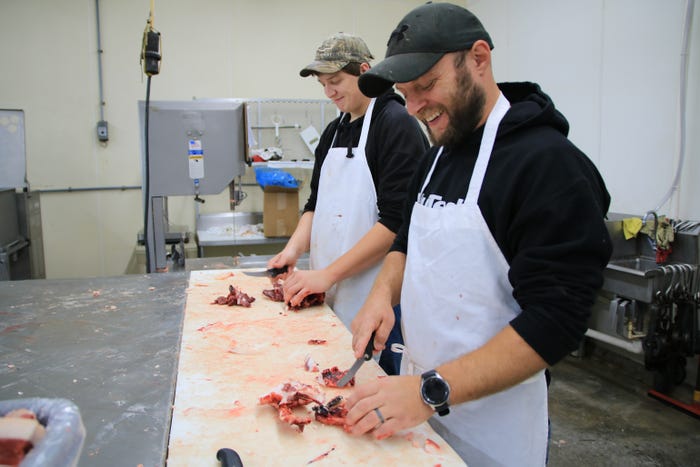
The 100-plus small and medium-sized meatpackers in Illinois received a wave of new business during the coronavirus pandemic when larger processors had to turn away market-ready hogs and cattle. This proved an opportune time for Albion, Ill., meatpacker Country Home Processing to open for business under new owners, Edwards County farmer Curtis Kelsey and his son-in-law, Tyler Bodnar.
The family-operated processor opened amid the COVID-19 shutdown in March, offering beef and pork cuts in its retail storefront. By April, they started custom-processing for livestock owners.
Related: Complete coronavirus coverage
Thanks to the shutdown’s effects on larger meatpackers, the Albion facility is booked solid for custom processing until March 2021, with other small and midsized packers reporting a similar backlog. Country Home Processing is receiving animals from all across Illinois — in one case, as far away as St. Louis.
“He had a lot of trouble finding anyone to get it done, so he came to us. We only process just over 20 animals a week here,” Kelsey says, adding that before becoming a meatpacker himself, he sold freezer beef from his farm to customers. He would haul small loads to independent meatpackers like the one he now operates to do the processing.
“Our sales have grown since then. Our retail business has been really strong,” he says of local demand for their meats. Kelsey raises all their retail beef on his farm, and pork comes from local farrow-to-finish operation Stumpy Hill Farms.
Making the best
Country Home Processing isn’t alone in making the best of the pandemic. Even after a fire, Raber Packing Co. in Peoria, Ill., is rebuilding.
Brandon Klehm is technical adviser to the Illinois Association of Meat Processors and serves as a University of Illinois meats judging coach. He says the boom in demand for custom processing will likely last for a few years, making him bullish on the industry.
“Even during this pandemic and potential recession, they [Raber Packing Co.] still see a very strong outlook on their company and are getting back into processing,” Klehm says. “Overall, small and midsized processors are wanting to ride this wave of demand.”
Kelsey anticipates demand will hold strong as restaurants have started to reopen, turning to his business for commercial cuts because it keeps prices low compared to food distributors.
“We’ve been watching the prices and try to stay under everybody a little bit. Our hamburgers are a dollar under everybody, on average,” Kelsey explains.
 TONS OF CUTS: Braxton Warren (left) and Stephen Vallette cut T-bones, rib-eyes, filets, beef roasts, sirloins and beef hearts for Country Home Processing customers.
TONS OF CUTS: Braxton Warren (left) and Stephen Vallette cut T-bones, rib-eyes, filets, beef roasts, sirloins and beef hearts for Country Home Processing customers.

Kelsey and his wife, Erica, say they wish they would have gotten the ball rolling on opening a month before the coronavirus took hold, as they spent a few weeks waiting on a federal inspector to come out and approve their setup. Even getting through to federal regulators on the phone was difficult at first.
That set them four weeks behind and meant they had to back up their custom-processing customers as well as delay the opening of their retail storefront.
“It took us a whole month to open and get all paperwork done when we took over the building,” Kelsey says. “But in May, we went from being booked to November to being booked to February 2021 almost instantly.” He notes the bookings have slowed since then, mostly because hogs live six months. The surge in demand came from consumers buying hogs from producers below the price of production.
“Everybody was buying them for cheap since the meatpackers weren’t taking as many. They couldn’t figure out who was going to cut them up for them. And then they found out everyone, like us, was booked solid,” Kelsey explains.
Family breaks into industry
Klehm says while he’s hopeful for the small and midsized meatpacking industry, it’s a tough business to break into. Country Home Processing’s co-owner, Tyler Bodnar, was essential in teaching his father-in-law how to cut meat. While Kelsey had experience butchering for his family, butchering commercially is a different animal — and Bodnar’s experience from owning another locker in Langdon, N.D., helped.
“There’s the experience hurdle,” Klehm says. “I would say you need about a year of instruction to get into custom and commercial processing. Then there’s the cost of the building, inputs and then regulatory hurdles.” He says USDA inspects commercial kill and cutting days at small meatpackers. While the state covers the inspector’s pay, overtime is on the meatpacker.
Custom processing days don’t require inspection, “but they’re in and out on those days, too,” Kelsey says.
Erica says their son Jaxon is more involved on the farm, while daughter Lidia likes the meatpacking business. Their older daughter Rilee and husband, Stephen Vallette, manage the business’s day-to-day operations — doing everything from taking orders to processing meat.
Altogether, the family has grown the storefront to start selling ice cream and other items to diversify their revenue.
“It’s really a family-operated business. I mean, we have other employees, but they’re like our family now. We’ve learned and grown together,” Erica concludes.
Read more about:
Covid 19About the Author(s)
You May Also Like




